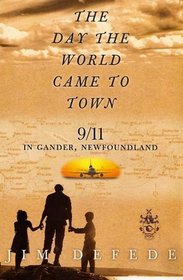The 126 hour period of time between when the first plane landed in Gander, a small town in Newfoundland (with a very large airport) and the last plane left, had to be one of the most remarkable in the region's storied history. Many unprecedented things happened that tragic day, but among the most profound was the closure of the entire US airspace, which meant that aircraft arriving from outside the US were all diverted elsewhere, most to Canada, if they could not turn around in flight to return to their point of departure. And so it was for dozens of full planes which ended up in Gander.
The book addresses the immense effort and the logistics involved in how this small town contended with the acute difficulties of what constituted essentially an entire town showing up on a single day, with people (and animals) from all over the world: how to care for them all? Passengers ranged from from distraught members of victims' families, including the parents of a missing firefighter, to persons who spoke no English, including multiple members of a Moldovan refugee family, resulting in numerous linguistic complications, to observant Orthodox Jews, with special dietary needs. Other immediate needs involved procuring hundreds of prescriptions for passengers from dozens of countries, and caring for the numerous animals on board the planes. This book thus tells the story of that fateful week, and the diverse population of generous townsfolk who made it all possible.
Perhaps for all these reasons, this story has evolved into many different tellings, including a made-for-TV movie, a BBC radio play, and, most strangely, to me, a Broadway musical, called "Come From Away." It is a heartening story: how so many diverse people came together to provide for nearly 7,000 people on 38 planes from dozens of countries in the most hospitable way, under unimaginably difficult circumstances.
The most moving account, for me, was the story of the elderly Holocaust survivor, who was evacuated from Poland to Britain as a child, after being relentlessly persecuted, who lost his entire family, probably in the camps. Because of his lifelong trauma, he concealed his Jewish heritage, until he learned that a rabbi from London was one of the "plane people" in Gander, and decided to meet with him, to tell him his life story. Even the man's relatives, who had only learned ten years before, that he was even of Jewish descent, urged him to continue concealing his heritage. The man simply wanted to pass on his story to another who could understand what had happened to him over the course of his entire life, so that someone would know his story, after he died. Mission accomplished.
It's not the story one usually hears in accounts of 9/11, which is a pity. This event is the other side of humanity, which demonstrates that ability of people from many different backgrounds and circumstances to pull together in the wake of a disaster.
I will have to defer to my fellow reviewers regarding some of the factual errors. It was very readable, if, admittedly, a bit dry at times. It generally did an admirable job of telling the stories of t the various individuals, if a bit selectively, and was very humanizing, but in other ways, perhaps by necessity, it was rather superficial. Each of these various sets of people, from the SPCA volunteers, to the pharmacy and medical staff, to the customs agents, could probably merit a book of their own, but this was a good overview of all that occurred during this unprecedented event.
Much of the story of 9/11 focuses on the many heroes and heroines whose bravery shone through a horrific tragedy against so many Americans. DeFede's book sheds light on other heroes: the townspeople of Gander, Newfoundland. Finding their airport the landing strip for an abundance of airplanes turned away from closed American airspace and their tiny town filled with stranded passengers, Gander's residents opened their hearts, wallets, and homes. Their warmth and kindness fill the pages of the book.
While it is very challenging to keep track of the many people--townspeople and travelers alike--it is their needs that are intriguing. Upon landing in Gander, the travelers are not immediately allowed off of their planes, without any idea of how long they will have to stay on the planes. When they are allowed to disembark, they have no idea when or how they will get to their respective homes. DeFede points out the special challenges of smokers, patients requiring prescriptions, animals in the planes' holds, and Jews requiring kosher food.
The book intersperses its chronological narrative with funny anecdotes, like that of a man slipping into his guest room bed, unaware that it's occupied by a stranger; the "Screeching-In" ceremony, which requires initiates to kiss a dead fish; and the tribulations of a Hugo Boss executive forced to wear lesser-quality underwear. There's a hint of romance; two stranded travelers find solace in each other during their brief stay in Gander. And there's tragedy, as a couple eventually learns that their son, a fireman, was killed in New York City on 9/11.
A short, informative read about unsung heroes.
An interesting book about a small piece of recent history that most of us have no knowledge about. The stories about the generous, helpful people of Newfoundland makes me want to vacation there.
One of the best books I've read this year. The true story of the town of Gander, Newfoundland and the wonderful people there who took in stranded strangers by the thousand, and did it with a smile. Heartwarming, inspiring, and wonderful don't even begin to describe it. I am definitely keeping this book - and sharing it with friends. I want to go to Gander!




